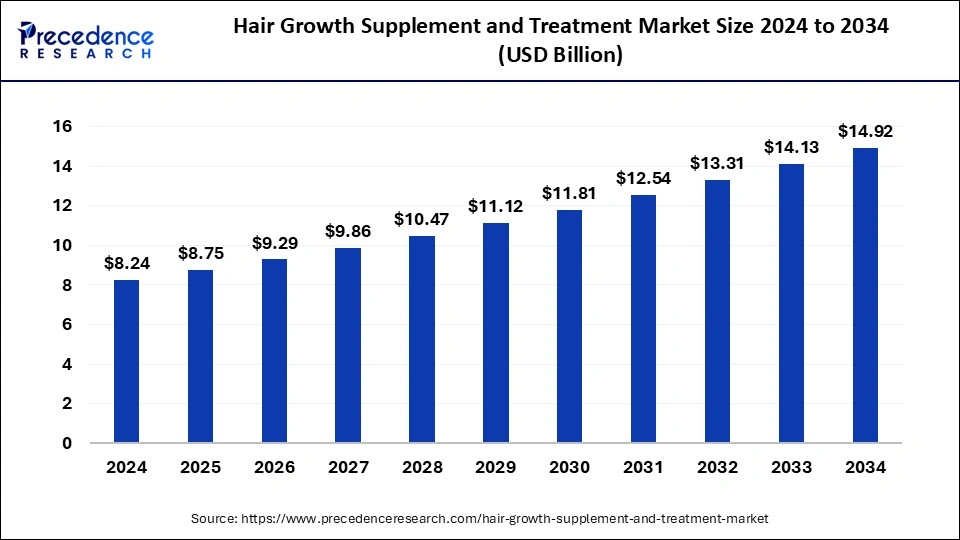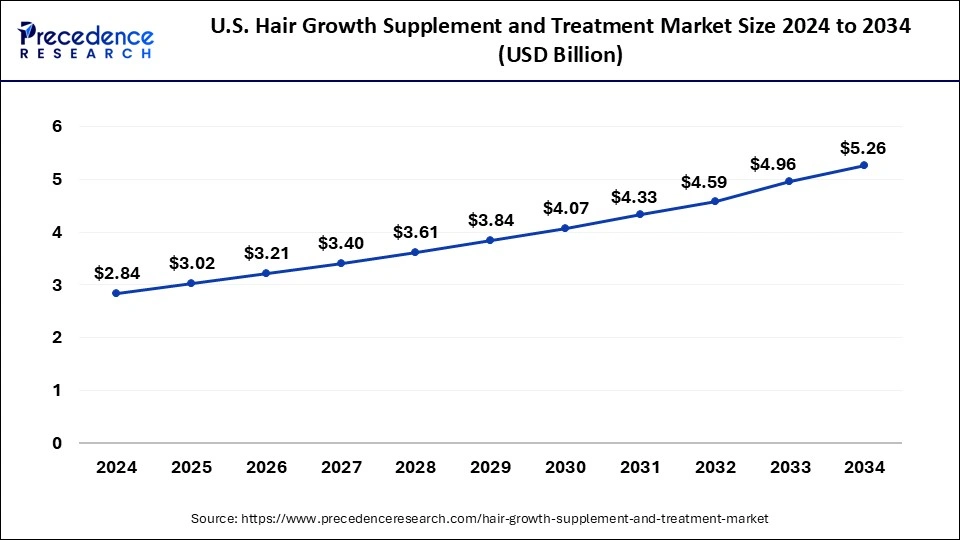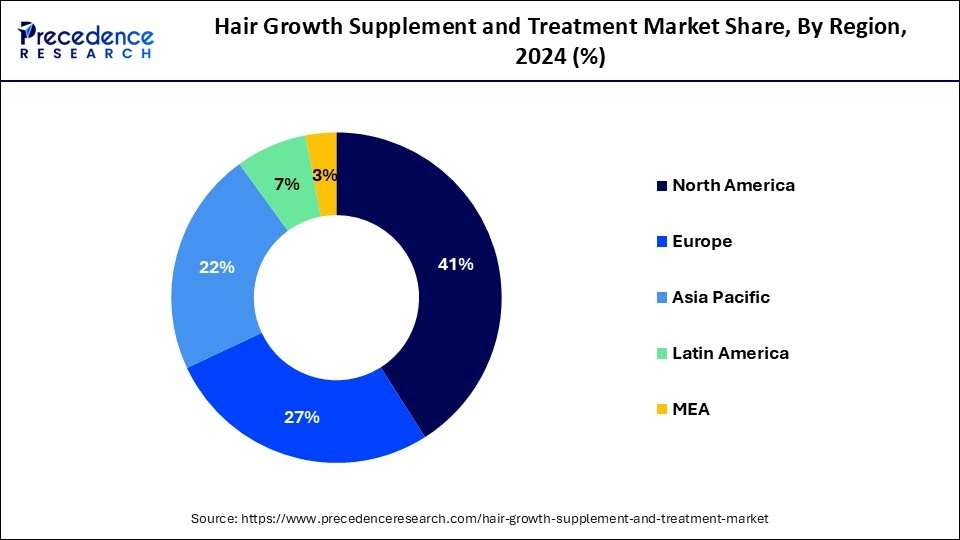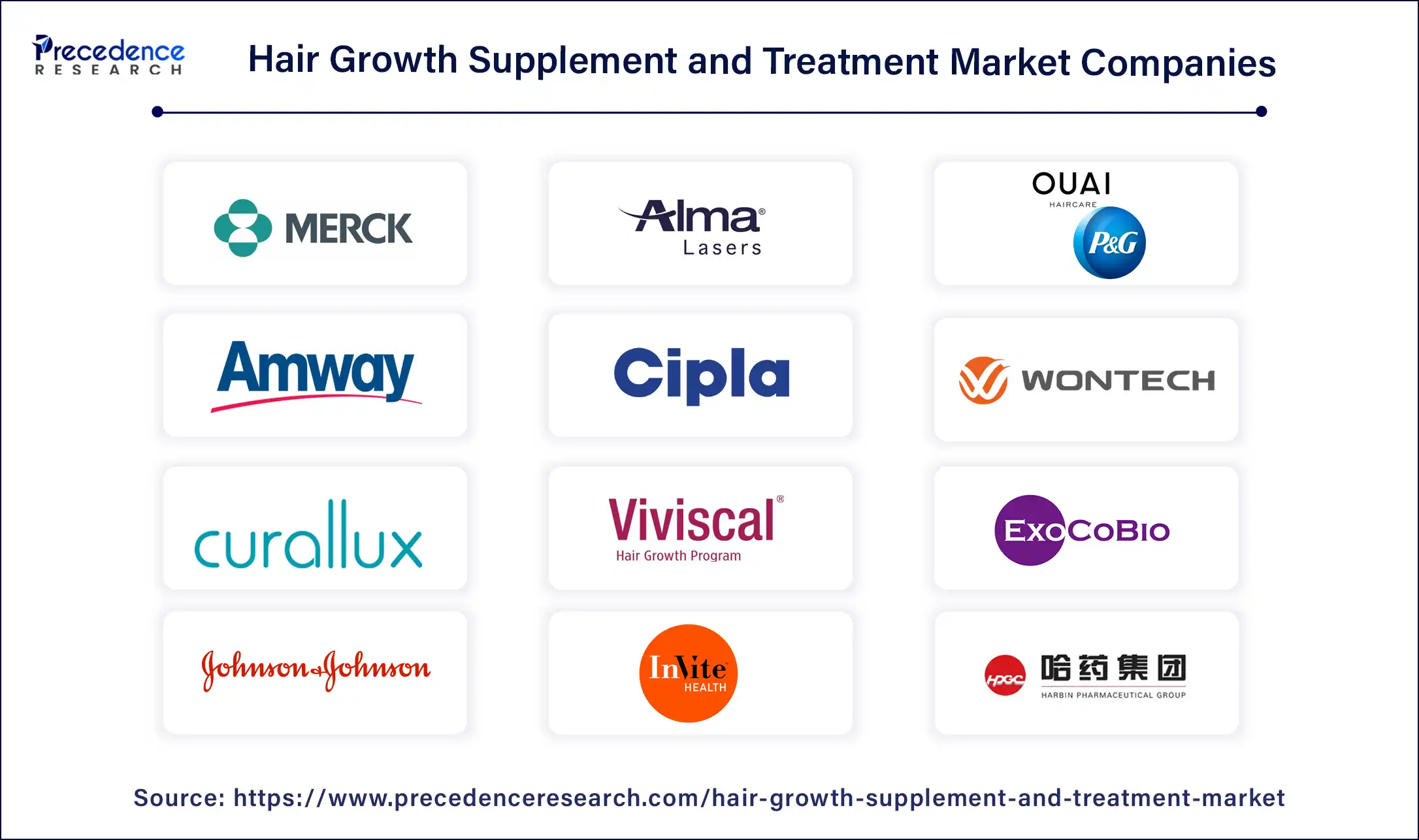March 2024
The global hair growth supplement and treatment market size is calculated at USD 8.75 billion in 2025 and is forecasted to reach around USD 14.92 billion by 2034, accelerating at a CAGR of 6.12% from 2025 to 2034. The North America hair growth supplement and treatment market size surpassed USD 3.38 billion in 2024 and is expanding at a CAGR of 6.12% during the forecast period. The market sizing and forecasts are revenue-based (USD Million/Billion), with 2024 as the base year.
The global hair growth supplement and treatment market size was estimated at USD 8.24 billion in 2024 and is predicted to increase from USD 8.75 billion in 2025 to approximately USD 14.92 billion by 2034, expanding at a CAGR of 6.12% from 2025 to 2034.

The U.S. hair growth supplement and treatment market size was valued at USD 2.84 billion in 2024 and is predicted to be worth around USD 5.26 billion by 2034 with a CAGR of 6.36% from 2025 to 2034.

North America dominated the hair growth supplement and treatment market in 2024. Increasing research and development, the presence of medical needs, and positive economic growth will help the growth of the market in the region. Changing lifestyles, pollution, stress, and genetics lead to hair loss conditions that contribute to the high demand for hair growth supplements and treatments.

Europe is estimated to be the fastest-growing during the forecast period of 2025-2034. The rising prevalence of nutritional deficiency and the increase in the number of senior populations are leading to the growth of the hair growth supplement and treatment market. French companies consult about the oils for longer and thicker hair growth.
The hair growth supplement and treatment market refers to a wide range of products and treatments designed to stimulate hair growth, prevent hair growth thinning, and improve overall hair quality. These products include nutritional supplements, medical interventions, and topical therapies aimed at improving scalp health and promoting hair growth. Hair growth supplements work by delivering the main nutrients that are responsible for hair growth to the hair follicles. The main ingredients in the supplements are carefully selected for their ability to strengthen the hair follicles, promote blood circulation, and improve the overall health of the scalp.
The best vitamin supplements for hair growth include iron, folic acid, biotin, zinc, vitamin E, vitamin D, and vitamin B. Some hair growth supplements are formulated with these supplements to improve hair thickness, growth, and strength. Nutrient-specific or multivitamin supplements may help to bridge the nutrition gap. These factors help to the growth of the market.
| Report Coverage | Details |
| Market Size in 2025 | USD 8.75 Billion |
| Market Size by 2034 | USD 14.92 Billion |
| Market Growth Rate from 2025 to 2034 | CAGR of 6.12% |
| Largest Market | North America |
| Base Year | 2024 |
| Forecast Period | 2025 to 2034 |
| Segments Covered | Type, Distribution Channel, and Regions |
| Regions Covered | North America, Europe, Asia-Pacific, Latin America, and Middle East & Africa |
Rising prevalence of hair loss conditions
Many factors can cause the increase in hair loss, including hairstyles that pull the hair, fungal infections on the scalp, hereditary hair loss from genetics, hormonal changes like menopause, childbirth, or pregnancy, poor nutrition, stress, certain medical conditions like lupus and diabetes, significant weight loss, age, and family history of balding. There is a need for diagnosis, management, and treatment to overcome the hair loss issue. The treatments include hair transplants, platelet-rich plasma (PRP), medication, and supplements. These factors help the growth of the hair growth supplement and treatment market.
Rising awareness of nutritional health benefits of hair supplements
Raising awareness of the nutritional health benefits of hair growth supplements helps the growth of the market. Deficiency in iron, riboflavin, biotin, vitamin D, vitamin B12, and other nutrients are associated with hair loss issues. Eating a balanced diet that is rich in these minerals and vitamins can help to improve hair growth. Zinc and vitamin B play an important role in the health of hair follicles. Taking specific supplements like iron, protein, vitamin B, vitamin C, vitamin A, and vitamin D or other specially formulated vitamins may help hair growth. These benefits of supplements help the growth of the hair growth supplement and treatment market.
Side effects of hair growth supplement and treatment
The side effects of the hair growth supplement and treatment include unwanted hair growth on the adjacent skin of the face and hands, scalp irritation, fake thyroid problems, diarrhea, nausea, allergies, rashes, cramps, and acne and breakouts. Overdosing supplements or nutrients can lead to side effects, including milk-alkali syndrome, which causes kidney injury due to high levels of calcium in the body, vasodilation that leads to a drop in blood pressure, and nerve damage. It may cause digestive distress, allergic symptoms like anaphylaxis, skin inflammation, and hives, and can cause gastrointestinal issues. These downsides of the supplements and treatments can restrict the growth of the hair growth supplement and treatment market.
Advanced technologies
The use of advanced technologies for hair growth helps the growth of the market. Advanced technologies for hair growth treatment include blood-derived platelet-rich plasma therapies, mesenchymal stem cell implantation, and MSC-derived secretome treatment. The microneedle patches deliver immune-regulating molecules to support T-cells so they do not attack hair follicles. The tiny RNA particles that encourage hair growth and genetic engineering help to create new hair follicles that may restore hair growth. These factors help the growth of the hair growth supplement and treatment market.
Research and Development
The use of natural products in hair growth supplements and treatments can be an opportunity for the development of the market. Chemical products for hair growth can lead to side effects, while natural products have no side effects. Natural products that help hair growth include applying herbs and other remedies, using natural oils like rosemary oil or castor oil, applying aloe vera, essential oils like coconut oil or lemon oil, scalp massage, decreasing inflammation, improving scalp health, balancing hormones, and stimulating hair follicles. These benefits of natural product development, innovative ingredients and formulations, and other technologies help to grow the hair growth supplement and treatment market.
The pharmaceutical segment dominated the hair growth supplement and treatment market in 2024. The pharmaceutical type of segment is further segmented into oral and topical & injectable. The oral type contains Propecia and minoxidil, and the topical & injectable types contain Propecia, minoxidil, and also exome-based therapies. Factors like changing lifestyles, genetics, pollution, and stress lead to the rising number of individuals getting pharmaceutical-based supplements to overcome hair fall issues. Oral type of supplements like zinc, iron, biotin, omega-3 fatty acids, and vitamins A, B, C, D, and E can be easily obtained from pharmaceuticals. Topical & injectable types of treatment include PRP injections, injections of corticosteroids, and scalp injections. These can easily obtained from pharmaceuticals. These factors help the growth of the pharmaceutical-type segment and contribute to the growth of the market.
The supplements segment is the fastest growing during the forecast period. The supplements are provided in different types, different forms, and with different distribution channels. The supplement types include single-ingredient and multi-ingredient types. The supplement types are in different forms, including liquid, capsules, tablets, gummies & soft gels, and powders. These supplements are distributed by different distribution channels, including drug & pharma stores, online pharmacies, specialty stores, and hypermarkets/supermarkets. The supplements include iron, which supports hair health; biotin, which prevents loss related to biotin deficiency and stimulates hair growth; and zinc, vitamin E, vitamin D, and vitamin B, which are essential for healthy hair growth and thickness and also prevent hair thinning and shedding. These factors help the growth of the supplement type segment and contribute to the growth of the hair growth supplement and treatment market.
The drug/pharma stores segment led the hair growth supplement and treatment market in 2024. Consumers visiting drug and pharma stores are often health-conscious and proactive about their wellness, making them more likely to seek and purchase hair growth treatments and supplements from these outlets. Pharmacists can recommend specific hair growth products based on individual customer needs, increasing the likelihood of purchases from their stores.

By Type
By Distribution Channel
By Geography
For inquiries regarding discounts, bulk purchases, or customization requests, please contact us at sales@precedenceresearch.com
No cookie-cutter, only authentic analysis – take the 1st step to become a Precedence Research client
March 2024
May 2024
August 2024
November 2024